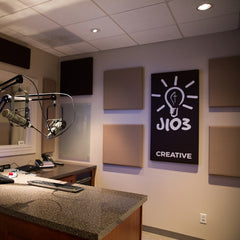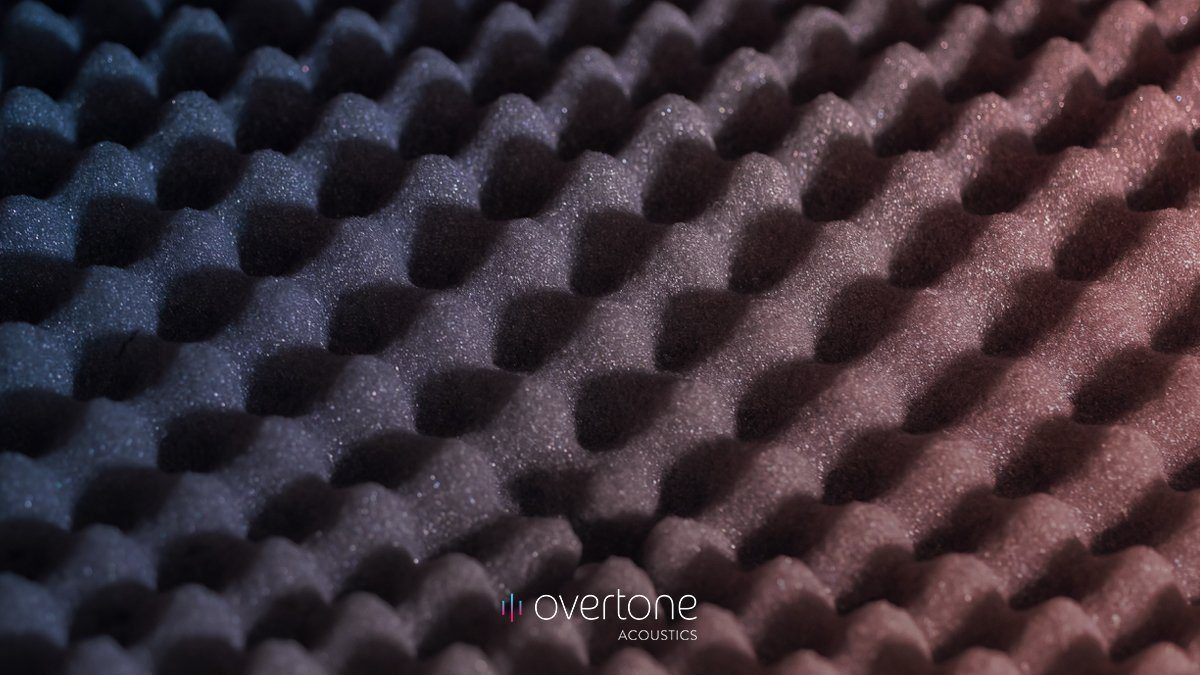Overtone Acoustic Solutions
Overtone Acoustic Solutions
Acoustic Panels vs. “Soundproof” Foam
Acoustic Panels vs. “Soundproof” Foam
When trying to resolve noise issues in your space, such as reverberation, choosing between professional acoustic panels or studio foam products can be tricky; especially if it’s your first time working with acoustical treatments. At Overtone Acoustics, we help you determine which solution works best for your problem as well as your budget. So, let’s break down the difference between acoustic panels and “soundproof” foam, what soundproofing really means, and which solution you should use depending on the noise issues you're facing.
What is the Difference Between Sound Foam and Acoustic Panels?
Acoustical foam is an open celled foam, often in the shape of cones or triangles. Like any acoustical treatment, the goal is to improve the sound quality in a room by removing residual sound. However, acoustical foam is really only effective at absorbing high-end frequencies, meaning if you have trouble with mid-frequencies or bass, then foam most likely will not greatly improve your sound situation.
Overtone Acoustic Panels, on the other hand, are constructed with a much denser core material meant for broadband absorption - which means it will absorb all frequencies and make a noticeable difference right away. This is why you typically see acoustic panels being used in professional recording studios over foam alone. Acoustic Panels help control sound wave reflections across all frequencies, creating a balanced sounding room that is ideal for recording and mixing audio. This concept goes for any space requiring less reverberation or unwanted noise.
Where studio foam is preferred for pricing, more often than not, professional acoustic panels are the better long-term solution.
What Does Soundproof Mean and How Does It Work?
Soundproofing means reducing sound waves from transferring from one room to another, allowing you to block sound out or prevent it from leaving the room. Soundproofing works by using dense materials that either reduce or absorb sound. While sound usually cannot be blocked completely without proper construction techniques, substantial noise reduction is possible when using professional acoustic panels.
So, Is Soundproof Foam Really Soundproof?
The short answer is: no, "soundproof" foam is a myth. While acoustical foam can help reduce echo and higher frequencies, it will not block noise out or contain it completely. In the context of the definition we provided above, studio foam is not soundproof. It helps to reduce high frequency reverberations but does not completely eliminate the transfer of sound from one room to the other. So if your intention is to ensure no sound leaves or enters your room, contact our experts for professional sound proofing help.
Do Foam Sound Panels Actually Work?
This is a common question people first search when they realize they have an issue with sound in their space. Regardless of where you're facing noise issues, it's important to note that acoustical foam panels will help to reduce higher frequency sound, but they will not eliminate mid-range or bass frequencies from reverberating. In most cases, this will help somewhat - but likely not enough to completely fix your sound issue. This is why professional acoustic panels are the preferred choice. Acoustic Panels absorb a much wider spectrum of frequencies, ultimately resulting in more control over the sound in your space.
Why Buy Acoustic Panels?
 Overtone Acoustic Panels offer a wider range of solutions than studio foam. Yes, you might feel they're on the pricier side, but we guarantee that it is well worth the investment - especially if you're serious about improving the quality of sound in your space. Not to mention, Overtone Acoustic Panels are offered in a ton of different sizes and color options, allowing you to coordinate your acoustic treatment with the aesthetic of your interior design.
Overtone Acoustic Panels offer a wider range of solutions than studio foam. Yes, you might feel they're on the pricier side, but we guarantee that it is well worth the investment - especially if you're serious about improving the quality of sound in your space. Not to mention, Overtone Acoustic Panels are offered in a ton of different sizes and color options, allowing you to coordinate your acoustic treatment with the aesthetic of your interior design.
Escape the noise and count on Overtone Acoustics to improve the sound quality of your space. See our Acoustic Panel and Bass Traps collections and utilize our Acoustic Calculator to see how many acoustic panels you need to soundproof your space today!
If you'd like the assistance of Overtone Acoustical Engineers - you can easily get started with a Free Acoustical Assessment or call 415-855-4950 today.
When trying to resolve noise issues in your space, such as reverberation, choosing between professional acoustic panels or studio foam products can be tricky; especially if it’s your first time working with acoustical treatments. At Overtone Acoustics, we help you determine which solution works best for your problem as well as your budget. So, let’s break down the difference between acoustic panels and “soundproof” foam, what soundproofing really means, and which solution you should use depending on the noise issues you're facing.
What is the Difference Between Sound Foam and Acoustic Panels?
Acoustical foam is an open celled foam, often in the shape of cones or triangles. Like any acoustical treatment, the goal is to improve the sound quality in a room by removing residual sound. However, acoustical foam is really only effective at absorbing high-end frequencies, meaning if you have trouble with mid-frequencies or bass, then foam most likely will not greatly improve your sound situation.
Overtone Acoustic Panels, on the other hand, are constructed with a much denser core material meant for broadband absorption - which means it will absorb all frequencies and make a noticeable difference right away. This is why you typically see acoustic panels being used in professional recording studios over foam alone. Acoustic Panels help control sound wave reflections across all frequencies, creating a balanced sounding room that is ideal for recording and mixing audio. This concept goes for any space requiring less reverberation or unwanted noise.
Where studio foam is preferred for pricing, more often than not, professional acoustic panels are the better long-term solution.
What Does Soundproof Mean and How Does It Work?
Soundproofing means reducing sound waves from transferring from one room to another, allowing you to block sound out or prevent it from leaving the room. Soundproofing works by using dense materials that either reduce or absorb sound. While sound usually cannot be blocked completely without proper construction techniques, substantial noise reduction is possible when using professional acoustic panels.
So, Is Soundproof Foam Really Soundproof?
The short answer is: no, "soundproof" foam is a myth. While acoustical foam can help reduce echo and higher frequencies, it will not block noise out or contain it completely. In the context of the definition we provided above, studio foam is not soundproof. It helps to reduce high frequency reverberations but does not completely eliminate the transfer of sound from one room to the other. So if your intention is to ensure no sound leaves or enters your room, contact our experts for professional sound proofing help.
Do Foam Sound Panels Actually Work?
This is a common question people first search when they realize they have an issue with sound in their space. Regardless of where you're facing noise issues, it's important to note that acoustical foam panels will help to reduce higher frequency sound, but they will not eliminate mid-range or bass frequencies from reverberating. In most cases, this will help somewhat - but likely not enough to completely fix your sound issue. This is why professional acoustic panels are the preferred choice. Acoustic Panels absorb a much wider spectrum of frequencies, ultimately resulting in more control over the sound in your space.
Why Buy Acoustic Panels?
 Overtone Acoustic Panels offer a wider range of solutions than studio foam. Yes, you might feel they're on the pricier side, but we guarantee that it is well worth the investment - especially if you're serious about improving the quality of sound in your space. Not to mention, Overtone Acoustic Panels are offered in a ton of different sizes and color options, allowing you to coordinate your acoustic treatment with the aesthetic of your interior design.
Overtone Acoustic Panels offer a wider range of solutions than studio foam. Yes, you might feel they're on the pricier side, but we guarantee that it is well worth the investment - especially if you're serious about improving the quality of sound in your space. Not to mention, Overtone Acoustic Panels are offered in a ton of different sizes and color options, allowing you to coordinate your acoustic treatment with the aesthetic of your interior design.
Escape the noise and count on Overtone Acoustics to improve the sound quality of your space. See our Acoustic Panel and Bass Traps collections and utilize our Acoustic Calculator to see how many acoustic panels you need to soundproof your space today!
If you'd like the assistance of Overtone Acoustical Engineers - you can easily get started with a Free Acoustical Assessment or call 415-855-4950 today.




